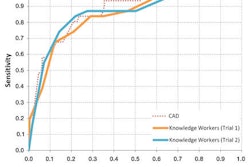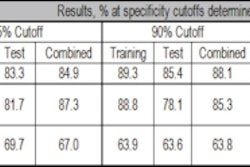Nearly a third of individuals who underwent colorectal cancer screening with virtual colonoscopy (also known as CT colonography or CTC) say they would have skipped screening entirely if VC had not been available, report researchers from the University of Wisconsin in Madison.
The retrospective study, presented October 25 at the International Symposium on Virtual Colonoscopy in Boston, was based on an analysis of survey responses from 573 individuals (mean age, 57 years). After VC was complete, the cohort received a survey in the mail asking them to report on the experience. A subset of patients who had undergone both conventional and virtual colonoscopy were asked to rate both exams.
Colorectal cancer screening compliance stands at about 55% of eligible adults according to 2008 figures, the latest available from the National Institutes of Health. It's a long way up from the approximate 25% screening rates seen in the 1990s, said lead researcher B. Dustin Pooler from the University of Wisconsin.
But colorectal cancer still lags behind both cervical and breast cancer screening, which are up in the mid-60s and low 70s, Pooler said.
"We'd all like to see that go up, and we feel CTC is one of the ways to get people screened," Pooler said, noting that previous studies have shown that patients generally prefer CTC over optical colonoscopy.
Because screening CTC is widely available in Wisconsin, with several insurance carriers willing to pay for it, the investigators were able to design a study that examined how the availability of CTC affects people's willingness to undergo screening, as well as how screening with CTC affects their attitudes about the modality.
After VC screening at UW Health, a survey was mailed to a consecutive cohort of adults who had completed the procedure, which included purgative bowel cleansing and automated insufflation with CO2.
The 10 questions focused on the willingness of patients to undergo screening if CTC were not available, their reasons for selecting CTC over colonoscopy, and the patients' personal experience with CTC.
For about two-thirds of patients, CTC was their first colorectal cancer screening test, Pooler said. The remaining third of patients were about evenly split between those who had undergone conventional colonoscopy and some other exam.
"The most important question was 'If VC had not been available, would you have chosen to undergo traditional colonoscopy?' " Pooler said. One in three (31.2%) showed at least some hesitancy toward receiving optical colonoscopy.
"We really feel like it's probably a low estimate," Pooler said. "As you can imagine, it's very easy to circle 'yes' on a survey, but when it comes time to make that colonoscopy appointment -- going through the prep and the procedure -- we do feel like maybe a few more people might not go."
Of the 145 respondents who had experienced both CTC and colonoscopy, 84.8% (486/573) indicated that they preferred CTC. The reasons for choosing CTC for screening included:
- Noninvasiveness of CTC (67.5%)
- Avoidance of sedation/anesthesia (63.0%)
- Ability to drive immediately after the test (52%)
- Avoidance of colonoscopy risks (48.9%)
- Possibility of identifying abnormalities outside the colon (38.4%)
In all, 90.6% of participants labeled their overall experience with CTC as "good" or "excellent," and 91.8% said they would recommend CTC to their family or friends.
As for limitations, the study was retrospective and mailed to patients after the exam was complete, Pooler said. The group that sent back the survey was self-selected and, in fact, had chosen to undergo both colorectal cancer screening and VC.
After Pooler's presentation, a member of the audience said it would be useful to probe the views of people who had not made the decision to undergo screening, even though both CTC and colonoscopy were available.
"The experience at UW with CTC is largely positive, and this could likely be replicated elsewhere," Pooler said. "Importantly, without the option of CTC, roughly one-third of our patients may not have been screened. And as a corollary to that, more widespread availability of CTC has the potential to substantially increase the adherence to colorectal cancer screening guidelines. However, in order for it to be made more widely available, it will have to be paid for somehow."
By Eric Barnes
AuntMinnie.com staff writer
November 10, 2010
Related Reading
Most choose VC over colonoscopy, study shows, August 27, 2009
New low-volume bowel cleansing solution effective, more acceptable, May 9, 2008
VC CAD finds polyps in prepped or unprepped patients, May 6, 2008
Patient survey suggests preference for minimal-prep VC, June 20, 2007
Minimal-prep VC preferred over colonoscopy, February 23, 2005
Copyright © 2010 AuntMinnie.com



















